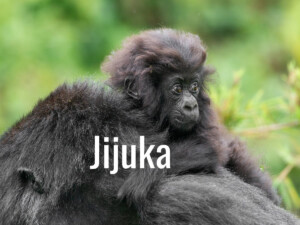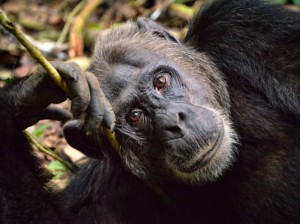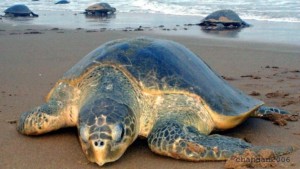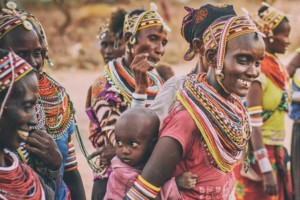Where next for wildlife conservation, ecotourism, & community well-being?
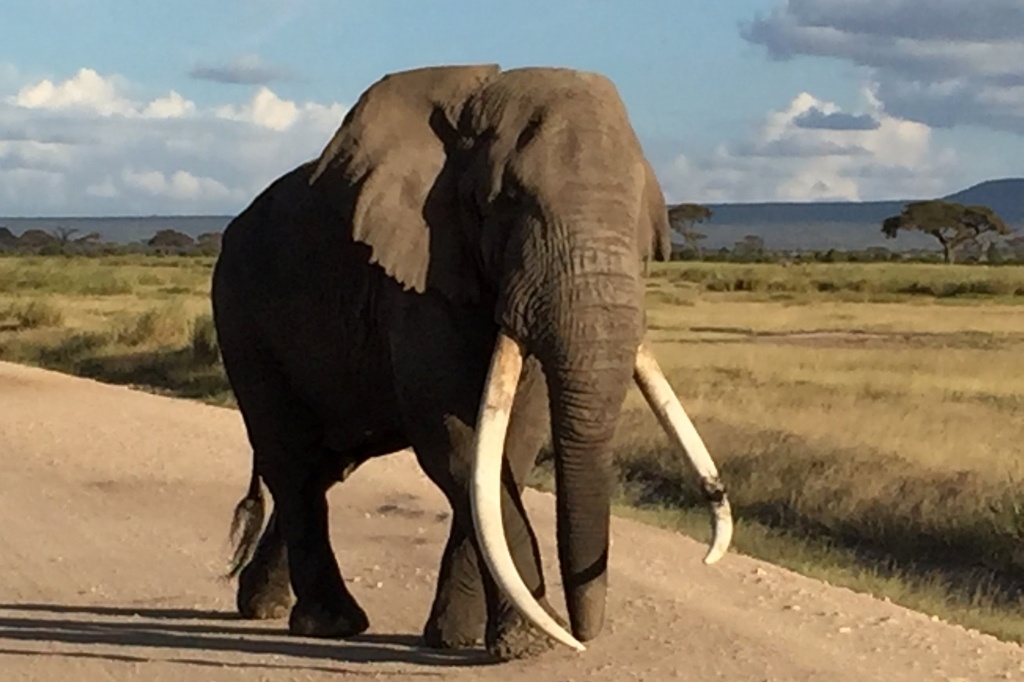
In many places, improved relationships between tourism operations, wildlife, and habitats were starting to deliver more sustainable outcomes, including the participation of local people. Then COVID-19 …
“Good Tourism” Insight Partner Planet Happiness invited conservation and community development expert Beth Allgood to share her thoughts in this exclusive “GT” Insight.
Seeing wildlife in their native habitat can be a life-changing experience. It can bring joy and wonder to those who experience it.
During my conservation career, I have had the great fortune of seeing one of the remaining great ‘tuskers’ — male elephants with huge tusks that can drag on the ground — in Amboseli, Kenya. My picture of Tim the tusker is featured above. I have looked grey whales in the eye in Laguna San Ignacio, Mexico. And I have watched sea turtles lay their eggs in Trinidad. These and the many other wildlife experiences I have had have brought me joy, peace, and a sense of purpose to protect the remaining biodiversity on Earth.
My work has also allowed me to witness communities who have lived close to wildlife for generations. In many of these communities, people understand the diverse ways that they are intertwined with nature. Their view of the world — that community well-being is deeply connected with nature — enables them to live with wildlife even as growing population and development pressures can result in increased human-wildlife conflicts.
Also see James Nadiope’s “GT” Insight
“How bees, trees, & tourism reduce human-wildlife conflict in Uganda”
Sustainable wildlife-centred tourism brings well-being and joy to those who want to experience wildlife in its native habitat. It also has the potential to support communities who look after their wilderness and environment. Sadly, tourism has also produced some negative outcomes for both communities and wildlife.
If not done sustainably and equitably with communities and wildlife in mind, tourism can increase revenues for some at the expense of the animals that attract tourists. It can also undermine the well-being of nearby communities.
When properly designed and managed, ecotourism can not only help protect wildlife and its natural habitats, but also benefit local communities by including them in tourism operations and the economic benefits that flow from tourism. Communities that regard the health and safety of their wildlife populations as an invaluable asset are less likely to engage in human-wildlife conflict. In turn, thriving wildlife is beneficial to the mental health and overall well-being of humans.
Pre-pandemic protection
The Maasai people in Kenya, for example, used to be entirely dependent on livestock for their way of life. This has historically caused conflict with lions, which are known to prey on Maasai livestock. Other wildlife too, such as zebras, compete with livestock for food and water resources.
The Maa Trust was established to diversify the economic structure of the Maasai community and to support their relationship with wildlife. Its resounding success would not have been possible without the financial benefits of responsible ecotourism.
Ecotourism through the Maa Trust generates several life-changing programs for the Maasai people, including educational and medical services. It has also been a catalyst for female empowerment in the face of the Maasai’s patriarchal roots. Girls now have the opportunity to go to school, and women have the opportunity to make money by selling beadwork and honey.
Halfway around the world, the community of Laguna San Ignacio in Baja, Mexico depends on fishing for most of the year, but from January to March it hosts tourists from all over the world. The visitors come to get close to amazing grey whale mothers and their newborn calves. Laguna San Ignacio is an important birthing and nursing area for grey whales. A community endowment supports conservation efforts, including the successful fight to permanently protect the land around the lagoon. Revenues from tourism and the endowment pay for the community’s well-being priorities.
Pandemic-induced problems
During the COVID-19 pandemic, what is happening to the wild animals and communities around the world that have benefited from ecotourism? When the pandemic hit, it at first seemed that wildlife would benefit. The suspected origins of the outbreak put an international spotlight on wildlife consumption practices in China. This prompted the Chinese government to ban the trading of wildlife and the consumption of wild animals.
Initial statistics suggested that poaching activities were on the decline. Worldwide seizures of elephant ivory, rhino horn, and pangolin scales dropped by 50% from 2019 to 2020. Many assumed that meant illegal trafficking had also dropped. But, according to conservation experts, the drop in seizures may be a result of travel restrictions. Poachers and traffickers are now using alternate routes by land or sea, or otherwise stockpiling wild animal products for when markets become accessible again.
Also see Ronda J Green’s “GT” Insight
“The effects of COVID-19 lockdowns on wildlife and wildlife tourism”
As the pandemic continued, it became abundantly clear that any apparently positive impacts on wildlife were either misleading or completely offset by the overwhelmingly negative economic impacts of travel restrictions on the communities stewarding wildlife habitats. Some people in some communities turned to poaching and/or habitat encroachment in acts of desperation.
Among the Maasai, for example, more intensive agricultural practices are beginning to take over the wildlife habitats they were previously incentivised to respect. And women are losing their ecotourism-derived incomes, educational opportunities, and social status. This regression will make it more difficult for the ecotourism industry to return to full swing as international borders begin to reopen.
In Mexico, the lack of revenues from tourists during COVID puts the well-being of the Laguna San Ignacio community and grey whale nursery at risk.
Invest in conservation, ecotourism to build back better
The World Bank recognises the opportunity for ecotourism to assist in the recovery of the global economy — if we act quickly. In a new report, Banking on Protected Areas, they discuss case studies in Fiji, Brazil, Nepal, and Zambia. In all four cases it was found that responsible ecotourism produced income multipliers of between 1.5 and 1.85, and that the benefits tended to be higher for those living in poverty.
The recommendations of the report include that governments need to protect their natural assets, grow and diversify tourism businesses, and share the benefits with local communities, all while deploying strategies that avoid contributing to climate change.
Also see Daniel Turner’s “GT” Insight
“As we build back better, is sustainability enough to regenerate nature?”
The World Bank’s findings and recommendations are consistent with our values at OneNature. We believe that peaceful coexistence with nature is beneficial to the well-being of humans and animals alike, and that understanding communities living most closely with wildlife is crucial for effective planning.
All too often community perspectives are inadequately considered in conservation project design and execution. And an all-too-often exclusive focus on the economic value of wildlife can lead to projects that reduce overall well-being and leave communities vulnerable to events such as COVID-19 when tourism-derived revenues disappear.
OneNature has partnered with the Happiness Alliance to develop well-being survey tools and community-led processes to understand and support communities living with wildlife. We are excited about our partnership with Planet Happiness, which will allow us to assess well-being linkages with wildlife conservation and tourism in communities where both are vital. Together we are creating a framework for policy- and decision-making and project implementation that will put the well-being of communities and wildlife at the centre of the development of ecotourism and nature-based tourism. We hope that our framework will play a critical role as we rebuild communities and the tourism industry.
One of the silver linings on the very dark COVID-19 cloud is this opportunity we now have to shift the focus and purpose of tourism activities from economically benefiting the few to enhancing the well-being of all.
What do you think? Share a short anecdote or comment below. Or write a deeper “GT” Insight. The “Good Tourism” Blog welcomes diversity of opinion and perspective about travel & tourism because travel & tourism is everyone’s business.
Featured image (top of post): Tim the tusker. © Beth Allgood
About the author

Beth Allgood is the founder and president of OneNature, a US-based not-for-profit organisation that “protects wildlife and promotes human well-being” through research, community projects, and engaging partners to “ensure our system measures what really matters”. With experience in conservation, animal welfare, and community development accumulated since the 1990s, Ms Allgood believes that our post-COVID-19 well-being depends upon “how we rebuild with all beings in mind”. Her mission is to “help people recognise, value, champion, and act to protect the well-being and interconnection of all beings and the planet”.
Thanks to “GT” Insight Partner Planet Happiness for inviting Beth to contribute.



